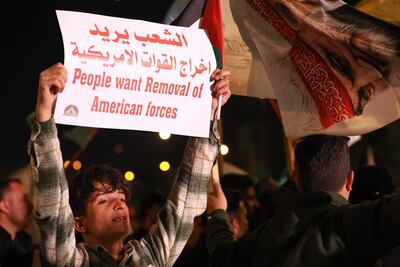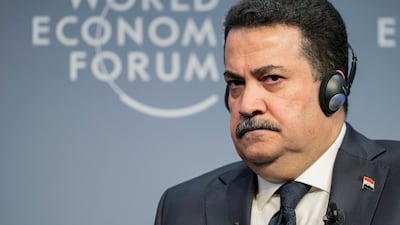An immediate dialogue between Iraq and the US-led International Coalition to fight ISIS is needed to reach an agreement to end their mission, Iraqi Prime Minister Mohammed Shia Al Sudani said on Thursday at the World Economic Forum in Davos, Switzerland.
Tension has risen in recent weeks between the US military and Iran-backed Shiite militias.
The militias, who also operate under a state-run umbrella group called the Popular Mobilisation Forces, have been launching almost daily drone and missile attacks against US troops in Iraq. The US military has retaliated with air strikes that have killed more than a dozen militants, according to government and PMF officials.
Iran-backed allied militias have also attacked US bases in neighbouring Syria, amid heightened tensions across the region due to the ongoing Israel-Gaza war.
The Iraqi government has denounced the attacks by the militias as “terrorist acts” and the US strikes as an “infringement to Iraqi sovereignty”.
It has demanded the withdrawal of the US troops and an end to the mission of the International Coalition formed in 2014 to fight ISIS and provide training and consultancy to Iraqi forces.
“Iraq, government and people, express utmost respect and appreciation for the international support that contributed, alongside the Iraqi people's valuable sacrifices, to defeating ISIS,” said Mr Al Sudani, who was interviewed on stage at WEF by John Harris, the global editor-in-chief of Politico.
But Mr Al Sudani said the “justifications” for the international presence in Iraq no longer existed.
“Today, according to all testimonies of all experts in Iraq and our friends, ISIS doesn’t pose a threat to the Iraqi state,” he said.
The militants are operating as "isolated groups fleeing and hiding in caves, mountains and desert, and are being pursued and eliminated by the [Iraqi} security forces,” he added.

When forming his government in October 2022, Mr Al Sudani pledged in front of the parliament to begin conversations to end the presence of the International Coalition.
In August last year, a senior Iraqi delegation visited Washington and agreed on forming a joint committee to start the dialogue, but the war in Gaza delayed the process.
“Today, following the repercussions and attacks on Iraqi security headquarters, we have an imperative: to immediately initiate a dialogue to reach an understanding on a timeline for concluding the mission of the international advisers,” said Mr Al Sudani.
He said he envisaged separate co-operation agreements in all fields with the member states of the International Coalition instead.
“Ending the International Coalition mission is crucial for Iraq’s security and stability,” he said. “It is also essential for maintaining constructive bilateral relations between Iraq and member states of the International Coalition,” he added.
“Our friends must understand that this is a clear official and national demand,” he said.
Mr Al Sudani has made similar calls over recent weeks. His government is supported by Iran-backed militias and parties, who are deeply opposed to the US presence in Iraq.
In 2003, the US led an international coalition to invade Iraq and topple Saddam Hussein’s regime, claiming it was developing and stockpiling weapons of mass destruction.
No such weapons were found and the invasion plunged Iraq into chaos.
The US withdrew from Iraq, leaving behind a small number of troops to protect its embassy and to train and assist Iraqi forces. At its peak in 2007, the US military presence included 170,000 soldiers.
Foreign combat troops returned in 2014, when ISIS seized about a third of the country as the US-trained Iraqi security forces melted away.
After the defeat of ISIS in Iraq by the end of 2017, the US started to reduce the number of its troops in the country – from about 5,000 to 2,500 now – along with other countries from the international coalition.
Fears of all-out war in the region
Mr Al Sudani criticised the international community for its “failure with its institutions and organisations to face this humanitarian, legal and ethical crisis” in Gaza.
“We are in front of a real genocide for two million Palestinians in crowded areas in Gaza, and we are facing the silence of the international community which only [uses] terms that lead to nothing,” he said.
Arab and world leaders who met in Cairo in October for a peace summit demanded a "ceasefire" between Israel and Hamas, pleading for "massive" aid to Gaza and a definitive "solution" to the 75 years of Israeli-Palestinian conflict.
“In Cairo, meeting immediately after the events, we all said one sentence: we don’t want the conflict zone to be widened,” he added.
“Today and after 100 days, the conflict zone has widened to the Red Sea to Lebanon to Syria and to Iraq, and we don’t know where this conflict will stop,” he said.
He warned that the area which he described as sensitive "represents a significant energy supply to the world and important economic passages, therefore the impact will not be confined to a specific area”.
“The international community has to assume its legal and ethical responsibilities towards the occupying government.
“The world cannot stand behind a reckless person like Netanyahu who has violated all international laws, norms and treaties,” he said.
“We are concerned that if things persist as they are, we may face an all-out war in the region.”


